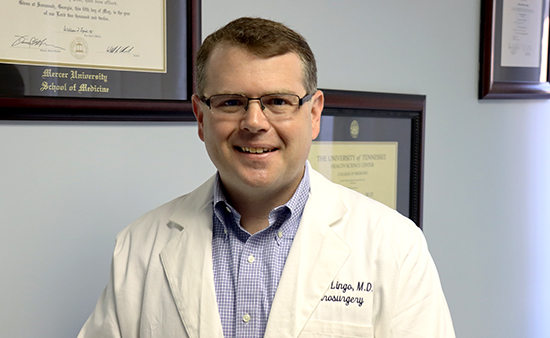What are the signs of a brain tumor?
Cancer
A Savannah neurosurgeon explains: Is it cancerous? Is it benign? Is it nothing?
May is Brian Tumor Awareness Month
Yes, a headache is one of the signs that you may have a brain tumor. But, there’s no reason to panic every time you get a headache.
“Everyone has headaches,” says Dr. P. Ryan Lingo, board-certified neurosurgeon with the Neurosurgical & Spine Institute. “This time of year, we all get headaches (due to pollen). It’s not specifically about the headache but how long it persists and that it’s not going away.”

A brain tumor is a mass of abnormal cells that grow in the brain or skull. There are many types of brain tumors and some are benign (noncancerous) while others are malignant (cancerous).
Of the cancerous tumors, a primary malignant neoplasm describes a tumor that started in the brain. Those are rare, but can be very symptomatic and serious, says Dr. Lingo, who also is part of the Nancy N. and J.C. Lewis Cancer & Research Pavilion’s brain tumor conference board.
Other cancerous tumors found in the brain are metastatic, or secondary malignant neoplasm of the brain, meaning they spread to the brain from cancer that started elsewhere in the body. Metastatic brain tumors are increasingly becoming more controllable with high five-year survival rates, Dr. Lingo says.
Benign tumors also are very treatable with surgery and/or radiation, and some that are considered low-grade benign tumors with little to no symptoms may just need monitoring.
Dr. Lingo has a special interest and fellowship training in treating brain and skull-based tumors, both benign and malignant. He sees patients daily with tumors and is in surgery several times a week to remove or biopsy brain tumors.
“MRIs and CTs are so prevalent in how we work up and diagnosis patients for a number of different conditions that we often find benign tumors by accident because they are asymptomatic,” Dr. Lingo says. “The more aggressive or malignant tumors are very symptomatic.”
So what are those symptoms?
Brain tumors can come with a variety of different symptoms, especially depending on where the tumor is located. Headaches are very common, but it’s not a very specific symptom as almost everyone gets a headache from time to time. Seizures are another common presenting sign.
Other symptoms can include changes to your vision, especially if the tumor is located near the optic nerves, or loss of hearing if the tumor is located near the hearing nerve. You may also experience dizziness, nausea or vomiting.
These symptoms, however, can be signs of many conditions. The key is to pay attention to how long your symptoms last and if they are not getting better with traditional therapies.
“The problem with brain tumors is, unless you have a seizure, a lot of the symptoms are not specific. If you are an adult and never had a seizure and all of the sudden you have a seizure, you should be checked for a brain tumor,” Dr. Lingo advises. “Otherwise, it’s not necessarily what the symptom is but the fact that it lasts way longer than it should, and it’s not going away with normal treatments.”
While the thought of a brain tumor – whether benign or cancerous – is very scary, if you have any of these symptoms, especially onset seizures or lingering headaches, you should talk to your primary care doctor. If an MRI or CT does show any sign of a brain liaison, you can meet with Dr. Lingo to discuss what that means and treatment options, which are available right here in Savannah.
“I think sometimes there’s a misconception that if you get diagnosed with a brain tumor that the expertise does not exist within our community to take care of you, and that’s absolutely not true,” Dr. Lingo says. “We get wonderful outcomes. We have the latest technology. We have a group of very dedicated, passionate and skilled physicians and surgeons to care for you.”
Coming Thursday: Learn more about that technology and treatment options for brain tumors available right here at St. Joseph’s/Candler and the Nancy N. and J.C. Lewis Cancer & Research Pavilion.